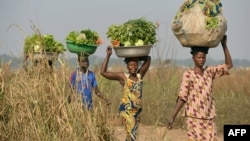DAKAR —
The International Committee of the Red Cross has begun distributing seeds and farming equipment in the Central African Republic (C.A.R.). The ICRC said the aid is vital to the survival of families who fled rebel attacks and now are returning home to find their farms and granaries destroyed.
The aid program targets more than 30 villages in the west of the country, and will give supplies to more than 13,000 people.
Tens of thousands of people have fled the area in recent months following clashes between armed rebel groups. Countrywide, more than one million have been displaced since the mostly Muslim Seleka rebel group overthrew the president in March 2013, prompting retaliation by the mostly Christian anti-Balaka militia.
Despite ongoing violence, many families have begun to return home, only to find they have nothing left.
Jean-Francois Sangsue is the chief of the ICRC delegation in the C.A.R.
He said the ICRC is working in partnership with the Central African Red Cross, and bringing agricultural assistance to people in the western region who have been victims of attacks by armed groups since the end of last year. Sangsue says their fields were burned, their homes looted, so the ICRC decided to give them assistance to help them plant and cultivate new fields.
The ICRC said each recipient family will receive sacks of bean, sesame and corn seeds, as well as tools, such as hoes.
More than 2.5 million people are already in need of immediate humanitarian aid. Poor harvests in 2013, because of the conflict, left food stocks throughout the country nearly depleted.
The Food and Agricultural Organization has warned that about 95 percent of C.A.R. communities say they will not have enough seeds for this year’s planting season.
Sangsue said this could increase the number of people facing hunger.
He said that assistance is vital in helping those victims return to their homes and cultivate their destroyed fields. The hope is that in four or five months, the people will be able to harvest their crops.
Sangsue said that as families await the harvest, the ICRC will work with its partners to distribute regular food aid to both returnees and internally displaced persons throughout the country.
The aid program targets more than 30 villages in the west of the country, and will give supplies to more than 13,000 people.
Tens of thousands of people have fled the area in recent months following clashes between armed rebel groups. Countrywide, more than one million have been displaced since the mostly Muslim Seleka rebel group overthrew the president in March 2013, prompting retaliation by the mostly Christian anti-Balaka militia.
Despite ongoing violence, many families have begun to return home, only to find they have nothing left.
Jean-Francois Sangsue is the chief of the ICRC delegation in the C.A.R.
He said the ICRC is working in partnership with the Central African Red Cross, and bringing agricultural assistance to people in the western region who have been victims of attacks by armed groups since the end of last year. Sangsue says their fields were burned, their homes looted, so the ICRC decided to give them assistance to help them plant and cultivate new fields.
The ICRC said each recipient family will receive sacks of bean, sesame and corn seeds, as well as tools, such as hoes.
More than 2.5 million people are already in need of immediate humanitarian aid. Poor harvests in 2013, because of the conflict, left food stocks throughout the country nearly depleted.
The Food and Agricultural Organization has warned that about 95 percent of C.A.R. communities say they will not have enough seeds for this year’s planting season.
Sangsue said this could increase the number of people facing hunger.
He said that assistance is vital in helping those victims return to their homes and cultivate their destroyed fields. The hope is that in four or five months, the people will be able to harvest their crops.
Sangsue said that as families await the harvest, the ICRC will work with its partners to distribute regular food aid to both returnees and internally displaced persons throughout the country.









